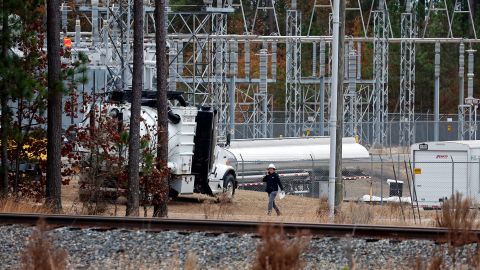CNN
—
Residents of a North Carolina county are entering a third day without lights or heating, after a suspected attack on electric substations resulted in a widespread outage that blanketed the county in darkness, shuttered schools and businesses and prompted a curfew.
At least 34,000 utility customers in Moore County were still without power Monday night, according to poweroutage.us.
They’ve been in the dark since Saturday evening, when two substations were damaged by gunfire, leaving millions of dollars’ worth of damage to equipment, according to the Moore County Sheriff’s Office.
Authorities have called the attacks “intentional” and “targeted,” with Moore County Sheriff Ronnie Fields saying that whoever fired multiple rounds at the substations “knew exactly what they were doing.”
No suspects have been announced in the case and it remains unclear what motivated the suspected attacks.
However, investigators are leaving “no stone unturned to find who did this and why,” North Carolina Gov. Roy Cooper told CNN’s Wolf Blitzer Monday.
“Clearly this an extreme act to intentionally disable this substation. We want to find who did it. We want to find the motive,” Cooper said when asked if there was any indication it was an act of extremism or domestic terrorism.
Fields has noted “no group has stepped up to acknowledge or accept they’re the ones who (did) it.”
The governor stressed that the state needs to learn from the incident, saying “we cannot tolerate this type of wide power outage.”
“We need to be diligent and vigilant, knowing that our electric grid can’t be this vulnerable, that someone with knowledge of how to disable the electrical system could come in and actually do that in a very short amount of time,” the governor added.
There was physical damage to only two substations, but it ultimately led to a larger outage that initially affected about 45,000 customers, Jeff Brooks, Duke Energy spokesperson said in a Monday news conference. That’s nearly all the customers the utility services in Moore County, he added.
At Monday’s briefing, the sheriff said it remains under investigation whether both substations were fired at simultaneously or one after the other.
As the investigation continues – with the FBI and state investigators now involved – the costly repairs to the substations are expected to go on for days.
Meanwhile, the outages have made life difficult for residents.
Those without generators and who don’t go to shelters must brace for cold overnight temperatures with no heating, leave their homes to charge their electronic devices and drive through intersections without traffic lights.
All Moore County public schools have closed and so have many businesses.
To stay open, FirstHealth Moore Regional Hospital in Pinehurst is running on a backup generator. However, the hospital is postponing certain elective procedures, according to a statement Sunday.
“Primary Care, Internal Medicine, Family Medicine and Convenient Care clinics in Moore County will be closed until power is restored,” hospital officials said.
The owner of one pharmacy in Moore County said he is storing medicines in his home, which is powered by a generator, so that people can continue to get their prescriptions.
Rob Barrett, the owner of Whispering Pines Prescription Shoppe, believes he has enough gas to keep the generator running, but the pharmacy faces other issues: some employees have no gas to get to work and there are communication issues.
In rural areas of the county, the loss of electricity has also impacted the water supply to families.
“Rural communities rely on electricity a lot more than people realize,” Andrew Wilkins, whose parents own a farm in Whispering Pines told CNN. “Many big cities don’t lose their water when the power goes out, but a lot of rural areas rely on a well for water. My family draws their water from a well, so when the power goes out, the well stops and the water pressure drops and we slowly lose water.”
A county-wide mandatory curfew from 9 p.m. until 5 a.m. has been in effect since Sunday night, with Fields saying the decision was made to protect residents and businesses.

The entire town of Southern Pines lost power, Mayor Carol Haney told CNN Monday.
“It is a selfish act. It is cruel,” the mayor said of the suspected attacks. “There are so many people that are hurting. The revenue stream has been stopped. If you have health issues, it is critical. It is just a horrible, horrible, terrorist, in my opinion, act,” Haney added.
She said she had to get her 98-year-old mother out of the town and to Charlotte so she could be in a warm home.
With the power out, the town’s water and sewer system is operating on generator power, according to Southern Pines Fire and Rescue.
The town’s fire department has also seen an increase in car crashes related to the lack of traffic lights, and more fires as people try to find alternate ways to heat their homes, Southern Pines Fire Chief Mike Cameron told CNN.
The fire department is also getting more medical calls from people on oxygen or other medical devices that require power, Cameron added.
Cooper noted in a Monday news conference that he is making sure vulnerable populations in the state impacted by power outages are taken care of, that people can stay warm and that emergency services are available.
The governor also said the state is “deeply concerned” about the impact the widespread outages will have on small businesses that had to close and students who are missing school.

Customers could “gradually” see more outages restored soon, Brooks, the Duke Energy spokesperson, said, but many people will be in the dark until Thursday.
“It’s not as simple as changing a lightbulb,” Brooks said, adding that “some of this equipment does take a significant amount of work, a significant amount of process that goes through putting it in to place safely, getting it in service.”
Brooks said some equipment can be repaired in place, but other pieces of equipment were damaged beyond repair and need to be replaced.
As the investigation continues, sheriff’s deputies are keeping watch over the county’s substations.
“Obviously we can’t predict with absolute certainty that it is over,” Cameron said. “But Law enforcement is heavily involved in protecting some of our infrastructure to make sure that nothing else happens.”